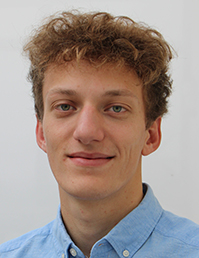Matthieu HAAKE received the 2025 Academic Thesis Prize for his research work among PhDs graduating in 2024.
Thesis Title: Développement d’une cathode à base de Co par ingénierie moléculaire pour la réduction du CO2 : De l’étude fondamentale d’un catalyseur greffé jusqu’à l’intégration en électrolyseur

Along with the development of batteries and water electrolysis, electrocatalytic CO
2 valorisation is another promising route to achieve efficient storage of renewable electricity produced intermittently by solar and wind farms. In the context of the carbon cycle closure, this approach focuses on the production of high added value solar fuels that can easily be integrated in the current energy mix. Coupled to CO
2 capture devices, this strategy will help limit and control the rise in CO
2 levels in the atmosphere. Over the past years, our group has been developing molecular structures with catalytic activities towards the reduction of CO
2, mainly allowing the production of carbon monoxide (CO) and formate with reasonable but improvable selectivity, activity and stability.
To overcome current limitations, our group aims to develop more complex and multifunctional matrices to enhance the catalytic activity of individual molecular catalytic sites. Initially, this project focused on the molecular engineering of a well-known catalyst for electrocatalytic CO
2 reduction, with the goal of enabling its direct integration onto electrode surfaces. This approach allowed to assess the performance of the novel hybrid catalyst in electrocatalytic CO
2 reduction to CO, achieving high selectivity (over 95%) and activity at low overpotential. Given the promising activity of this hybrid catalyst, it was subsequently integrated into a gas diffusion electrode for implementation in operational CO
2 electrolysers. Once integrated into the electrolyser device, the catalyst again demonstrated excellent CO
2 reduction activity and selectivity towards CO (of over 97%). However, maintaining catalyst stability during electrolysis remains a key challenge, as degradation can result in significant losses in both activity and selectivity. To address this issue, we identified the deactivation mechanism of the novel hybrid catalyst, enabling the future design of more stable molecular hybrid catalysts.
Key words: Valorisation du CO
2, Electrocatalyse supportée, Chimie de coordination, Catalyse moléculaire, Nanotubes de carbone
Doctoral School: ED CSV – Chemistry and Life Sciences
Research laboratory: Laboratoire Chimie et Biologie des Métaux (LCBM - CEA/CNRS/UGA)
Thesis supervision: Vincent ARTERO and Bertrand REUILLARD
>
To find out about all the 2025 thesis prizes